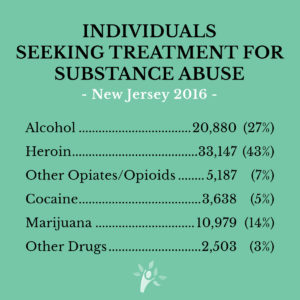
The United States is combatting the opioid crisis on several fronts. At the legislative level, lawmakers have begun regulating the dispersal of prescription opioid drugs. In New Jersey, for instance, a law passed in 2017 now limits the initial prescription fill on any opioid-based medication to 5 pills – a proactive first step to regulate doctors, and one that will hopefully reduce dependency for new patients.
Law enforcement at the local, state and federal level, are also working to stop the illegal importation of large quantities of narcotics, such as fentanyl, from countries like Mexico and China – a noble effort to reduce the supply of these highly addictive drugs on America’s streets.
But the primary and most effective means to curb addiction and reduce overdoses will likely stem from recovery-based initiatives – specifically by increasing substance abuse and mental health funding and passing parity legislation requiring private insurers to better cover treatment, thereby increasing access to patients in need of recovery services.
In 2016 there were 2056 opioid deaths in New Jersey – ranking as the 10th deadliest state for fatal overdoses. In response, last year Governor Christie signed a law increasing insurance coverage for 30% of the state’s residents and increasing New Jersey addiction help, to better cover treatment options. In September of the same year the Governor allocated $200 million aimed at increasing New Jersey addiction treatment access – including $40 million earmarked for Medicaid and Medicare services (lower income).
According to the statewide Substance Abuse Overview Report – as of May 2017, there were 76,509 treatment admissions in the state of New Jersey.
Top Five New Jersey Counties
Of the 21 counties in New Jersey, five counties (Ocean, Camden, Essex, Monmouth and Middlesex) made up over half (56.6%) of the total New Jersey addiction treatment admissions. Four of these counties are in the bottom half of per capita income, and two are in the bottom quadrant. Residents seeking New Jersey heroin rehab were most common in these counties.
Substance Abuse Treatment Admissions, 2016 State of New Jersey Top 5 Counties:
Camden6,5998.9%
| New Jersey County | Admissions | Percent |
| Ocean | 7,244 | 9.8% |
| Essex | 6,528 | 8.8% |
| Monmouth | 6,177 | 8.3% |
| Top Five | 42,038 | 56.6% |
| Rest of the State | 32,253 | 43.4% |
Poverty and Addiction
Many believe there is a high correlation between the instances of substance abuse and poverty. There is certainly a statistical correlation, though addiction is proven to affect individuals from all walks of life, ethnicities, class levels, educational level, occupations, gender and sexuality. According to the National Council on Drug Abuse, the strongest prevalent correlation linking addiction and poverty is the lack of resources disadvantaged individuals have in seeking adequate treatment. If it’s harder for a distant population to seek treatment, obviously there would be a higher prevalence of substance use in that population. Which is why Gov. Christie’s allocations to Medicaid and Medicare are so important in this battle.
Incarceration: Addiction And Mental Health
According to a 2006 Bureau of Justice Statistics Report, it was estimated that over half of the U.S. jail and prison population had symptoms of serious mental illness as indicated by the Diagnostic and Statistical Manual of Mental Disorders (DSM). A 2004 report indicated that in the state prison population, 47% of violent offenders, 52% of drug offenders and 27% of property owners reported either drug dependence/abuse, and/or exhibited symptoms of serious mental illness.
Historically, jails and prisons have become de-facto mental health and substance use treatment centers, with correctional officers unwillingly placed in the role of mediator, facilitator, and caregiver – most with little or no formal training in social work, case management, or behavioral health care. New Jersey heroin addiction has been outpacing New Jersey heroin rehabs and now New Jersey is working to fix that.
Inmate Drug Treatment Programs
In May of 2017, Governor Christie allocated $20 million to reconstitute a shuttered prison facility at Fort Dix and convert the complex into a 700 bed, acute drug treatment center for male jail and prison inmates. A similar 65-bed women’s program has recently opened at Edna Mahan Correctional Facility in Union Township. Both programs are medium security and provide inmates with access to medication-assisted treatment, 12-step programs, and case management services. Should the program yield successful results, backers of the initiative believe the facilities at Fort Dix and Edna Mahan could serve as a model for states nationwide to replicate.
The United States has a long history of criminalizing drug addiction, but some cities in the U.S. are taking an outside the box approach to those suffering.
Treatment Models In Major Western Cities – Non-Criminalizing
Over the past five years, alternative substance abuse treatment models have emerged, specifically related to the opioid epidemic, centering on the creation of “safe havens” for drug users, operating now in major cities like Seattle, San Francisco, Los Angeles and Denver. Within these “safe havens,” drug use is essentially overlooked, clean needles are provided for users, and these spaces are staffed by counselors and medical personnel supplied with life-saving medication to treat overdoses and to ultimately prevent death.
Taking a more practical approach, these centers ease a user into recovery, keeping him or her as safe as possible while fighting the addiction. At the same time, they isolate the drug use and the corresponding crime associated therein, into one segregated locale, within any given community, minimizing the exposure to other residents, in particular ,the exposure to children.
Recovery Treatment Is The Right Choice
With every opioid dose, the risk of death or serious harm to a user increases. Drug and Alcohol addiction is not sustainable. Maryland Recovery fully supports our neighbors in New Jersey, and across the country. We support the doctors, nurses, therapists and social workers on the front lines battling this crisis. And we support the efforts of governors and lawmakers who are taking commonsense steps to open access to treatment for everyone who asks for help.
At Maryland Recovery, we offer a helping hand to all the New Jersey families struggling with addiction and offer treatment options for anyone in recovery.
Get More Info About Our Programs
Reviewed by Christopher Schwartfigure MS, LGPC, CAC-AD









